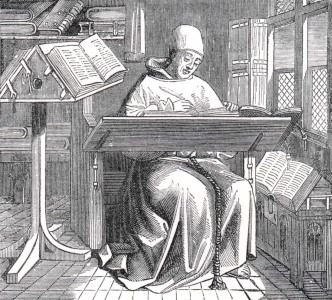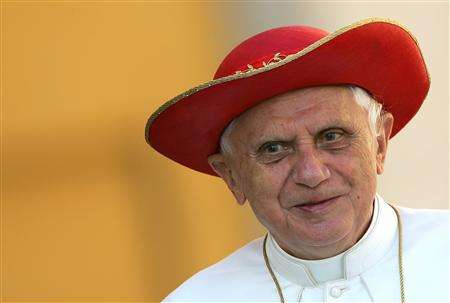In your next conversation with a Hindu friend about the merits of Christ, refer to the quintessential text of the Hindu tradition,
the Bhagavad Gita.(
Cliff Notes: The Bhagavad Gita is the story of a young man named Arjuna who hesitates on the edge of a battle field. Members of his own family are fighting on opposite sides of the battle. Enter Lord Krishna, the incarnate manifestation of Vishnu, one of the triad of Hindu deities. Krishna advises young Arjuna- the wuss- to get over it and to enter the battle. First, Krishna explains, all of life is merely fleeting and illusory, such that the violence of war is relatively inconsequential, any action- whether right or wrong- is ultimately destructive, and the people who die in battle will be incarnated anyway. Secondly, given the transience of life, it is most moral for Arjuna to do his duty as a member of the warrior caste and to simply fight this battle, rather than to puzzle over apparent moral quandries. Thirdly, Arjuna is to dedicate the simple performance of his duties to Krishna himself; in this way even the most mundane and objectionable acts become means of achieving the spiritual virtues of renunciation, surrender, and liberation from his Samsara-bound personal ego. It is imperative also that these duties be performed selflessly, without regard for their consequences or rewards, and as mere manifestations of the will of Brahman; ultimately, duties are to be performed out of "love" of the Lord Krishna, in whom alone all personal desire is fulfilled.)
There are several points which the Christian apologist can draw from this paradigmatic story.
1.
A Personal, Incarnate God. Although Hinduism joins the myriad of other Eastern traditions in affirming that Ultimate Reality is an impersonal, ungraspable, unknowable, and indescribable Void beyond all personal aspirations and attributes, there are persistent trends in Hinduism which describe this Reality as the
personal Brahman (which, in a complicated way, is the same "thing" as your own self in Hinduism, such that to realize Brahman is to realize one's own self). In the story above and througout the Upanishadic period in India, Brahman is described as having a personal will. Brahmin receives acts of personal devotion and sacrifices, and counts them towards the individual's release from Samsara. Most importantly for our purposes, the Gita recounts that Brahmin has one, paradigmatic, historical incarnation in Vishnu. Vishnu appears to the perplexed Arjuna in order to lead him to truth and to invite him to fellowship with himself.
This is a critical point of Christian/Hindu resonance: the notion of the personal and self-revealing god in search of the human person, who makes his fundamental inexhaustible mystery cognizable and experienced in the manifestation of the “redeeming” Lord Krishna; the “result” of such encounter is the achievement of desired union between god and the person.
2.
Redemption. One of the sources of anxiety in Hinduism is the need to secure benefits in the cosmic banking system of Karma, such that ultimately, one may be released ("Moksa") from the cycle of Samsara. The problem with Samsara is that one is trapped in an endless progression, from one finite stage to the next, wherein it remains eternally impossible to (really) satisfy one's desires. One is thus doomed to live with a constant sense of uncomfortable dissatisfaction because of his great desire for Ultimate Reality, combined with his finite inability to attain it. Various yogic (litt., "unitive") practices emerged through the centuries to facilitate release from Samsara, in order to develop the human spirit ("Atman") and intellect as a kind of spiritual vehicle which could carry the person to his resting place/salvation in Brahman.
These of course are themes familiar to both Christian and Hindu conceptualization: the story of the incapacitated human in agonized quest for the personal god; consummation in total surrender to this personal god; and the consolation of inner enlightenment through conformity and obedience to god.
3.
The sum of the dilemma shared by Hindus and Christians is an unquenchable longing for God, and the issue of what to make of an incarnation of God who appears to lead humanity to Himself. Here, it is important to remember the nuance that Hinduism posits that “the history of humanity is the history of salvation,” in an ongoing cycle of divine revelation and human progress. Here, parties to a Christian/Hindu conversation might query whether it is possible that
one particular historical event- in Christianity, the incarnation of God in Christ- might be absolutely central and normative for the entire historical process. Recall that the paradigmatic encounter between Krishna and Arjuna is in fact canonized and upheld (in Ghandi’s terms) as the “quintessence” of Hindu understanding.
Since Hindus are willing to acknowledge a point of “quintessential” revelation, they should be sympathetic to Christian claims of the quintessential revelation of God in Christ, and in the ultimate provision of redemption through Christ's crucifixion and resurrection.In sum: The conclusion of the matter is at this point, as Professor Volf says, to "tell them about Jesus." A Hindu might argue that all moments of divine revelation stand in dialectic relationship to one another, without uniqueness or precedence. But Hinduism's account of an incarnate god appearing to redeem humanity through an invitation to personal relationship, As Krishna does in the Bhagavad Gita, is paradigmatic for the Hindu. Authentic Christian belief holds not only that God reveals Himself truly "at various times and in various different ways," but also, as the relevant Epistle excerpt continues, “God has in these last days spoken (definitively) to us by his Son, who is the exact representation of God’s being.”
... and this is the God who has taken on our very flesh in order to suffer and die for our redemption in history, who intercedes for us, and who draws us into communion with Himself
even in the midst of our finite limitations. A Hindu, in his obvious desire to reach God, can't get any closer to the divine than in Jesus of Nazareth.
Gluttons for punishment can refer to my Reading and Discussing the Bhagavad Gita, available here.

























